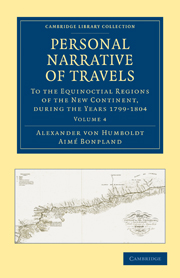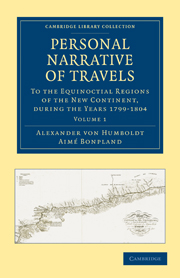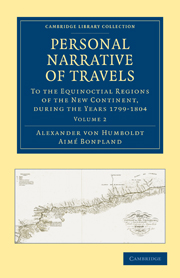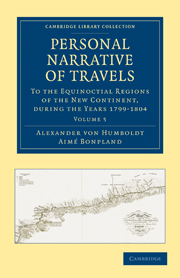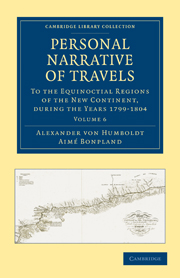Personal Narrative of Travels to the Equinoctial Regions of the New Continent
The Prussian naturalist Alexander von Humboldt (1769–1859) was one of the most famous explorers of his generation. Charles Darwin called him 'the greatest scientific traveller who ever lived'. In 1799, Humboldt and the botanist Aimé Bonpland secured permission from the Spanish crown for a voyage to South America. They left from Madrid and spent five years exploring the continent. Humboldt reported his findings in a total of thirty volumes, published in French over a period of more than twenty years beginning in 1805. This English translation by Helen Maria Williams of one important component of Humboldt's account, the Relation historique du voyage (1814–1825), consists of seven volumes and was published in London between 1814 and 1829. Volume 4 (1819) describes an earthquake in Caracas (which Humboldt links to the volcanoes of the West Indies), and mountains, plains, hot springs and river systems observed as the expedition travelled onwards.
Product details
June 2011Paperback
9781108027960
582 pages
216 × 33 × 140 mm
0.73kg
Available
Table of Contents
- Book V:
- 14. Earthquakes at Caraccas. Connection of this phenomenon with the volcanic eruptions of the West India islands
- 15. Departure from Caraccas. Mountains of San Pedro and of Los Teques. La Victoria. Valleys of Aragua
- 16. Lake of Tacarigua. Hot springs of Mariara. Town of Nueva Valencia de el Rey. Descent towards the coasts of Porto Cabello
- Notes to Book V
- Book VI:
- 17. Mountains that separate the valleys of Aragua from the Llanos of Caraccas. Villa de Cura. Parapara. Llanos, or steppes. Calabozo
- 18. San Fernando de Apure. Intertwinings and bifurcations of the rivers Apure and Araunca. Navigation on the Rio Apure
- Book VII:
- 19. Junction of the Apure and the Oroonoko. Mountains of Encaramada. Uruana. Baraguan. Carichana. Mouth of the Meta. Island of Panumana.

